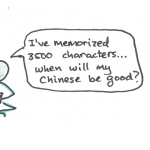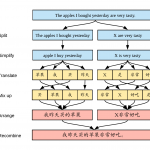Articles in the ‘Speaking’ category Page 6
-
The nine principles of learning (and the mistakes from failing to follow them)
In 2014, Scott Young spent 100 days learning Chinese, after which he was able to speak freely on a wide range of topics, as well as pass HSK 4. Since then, he’s continued exploring effective learning and has now published a book called Ultralearning. He hasn’t abandoned Chinese, though, and in this article, he discusses nine important principles for effective learning and how they relate to studying Chinese.
Read → -
101 questions and answers about how to learn Chinese
This is the biggest collections of questions and answer about how to learn Chinese anywhere. The questions are sorted into categories, and each question is answered briefly before links to further information is provided. If you have a question about how to learn Chinese, you’re very likely to find the answer here! If your question hasn’t been answered, please consider leaving a comment!
Read → -
7 things you were taught in Chinese class that are actually wrong
Some things your Chinese teacher tells you or you read in your textbook are well-meant simplifications. This is okay, because the whole picture might be overly complicated and not very helpful. Some other things your Chinese teacher tells you or you read in your textbook are just wrong, though. This article lists seven examples of things that are often taught in Chinese class, but are actually incorrect.
Read → -
How good is voice recognition for learning Chinese pronunciation?
Speech recognition technology has developed rapidly and can now be relied on to correctly identify standardised and clear pronunciation in Mandarin. But can it be used to check your Mandarin pronunciation? Not necessarily. This article looks at how well speech recognition software deals with non-native and low-quality audio, focusing on the question if speech recognition is too lenient for pronunciation practice.
Read → -
Using speech recognition to improve Chinese pronunciation, part 1
Speech recognition technology has developed rapidly and can now be relied on to correctly identify standardised and clear pronunciation in Mandarin. But can it be used to check your Mandarin pronunciation? Not necessarily. There are two problems that need to be investigated to answer that question. This article looks at the first: If speech recognition is unable to identify what you say, does that mean that your pronunciation is bad, or could it be the speech recognition that isn’t good enough?
Read → -
Training your Chinese teacher, part 2: Speaking ability
Finding a good Chinese teacher is not easy, but there are many things you can do to get more out of the time you spend with your teacher. In the second article in this series, I discuss focusing on speaking ability with a teacher, including what to look for in a good teacher, common problems and how to tackle them, along with some suggestions for more advanced learners.
Read → -
The beginner’s guide to Chinese translation
Translation from you native language to Chinese is not easy. The most serious problem for many beginners is that they stay too close to the original, which leads to incorrect word order in Chinese. This article presents a method for beginners and lower intermediate students, designed to avoid this problem and improve your translations.
Read → -
Tone errors in Mandarin that actually can cause misunderstandings
Accidentally saying “chest hair” in Chinese when you mean “panda” is amusing, but it rarely causes confusion. Let’s look at some tone mistakes that actually do cause confusion!
Read → -
How and why to learn and teach Chinese through games
This article is a follow-up to a keynote presentation and a workshop held at the 15th Annual Chinese Teaching Conference at University College London. Even though the original target group is teachers of Chinese, the article is relevant for students as well.
Read → -
8 tips for learning Chinese as an introverted student
Introverts are not necessarily worse language learners than extroverts, but not taking or creating opportunities to speak Mandarin will slow you down. In this article, I share some methods I’ve used to compensate for this as an introvert learner.
Read →









